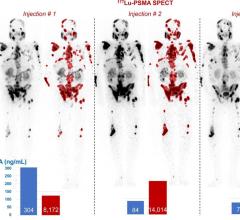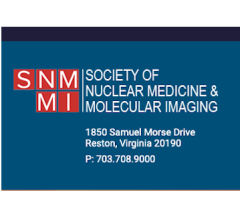January 27, 2009 - Lantheus Medical Imaging Inc. said today new data from a prospective, non-randomized, multi-national study shows gated single-photon emission computed tomographic (SPECT) myocardial perfusion imaging (MPI) with Cardiolite (Kit for the Preparation of Technetium Tc99m Sestamibi for Injection) had a 96 percent negative predictive value for diagnosing extensive coronary artery disease in patients hospitalized with their first episode of heart failure.
These study findings were published in the January/February 2009 issue of The Journal of Nuclear Cardiology.
More than 5 million Americans are living with heart failure - a chronic condition in which the heart can no longer pump enough blood to the rest of the body. Each year 550,000 new cases of heart failure are diagnosed. One of the most common causes of heart failure is coronary artery disease (CAD). Data from observational studies suggest that CAD is the underlying cause of up to 70 percent of patients with heart failure. CAD is the leading cause of death in the U.S. for both men and women, with more than half a million Americans dying from CAD each year. MPI is often used to determine the presence and severity of physiologically significant CAD in patients with suspicious symptoms. This is the first study to explore myocardial perfusion imaging’s diagnostic utility specifically in patients with new-onset heart failure.
“Because some patients with heart failure and extensive coronary artery disease may benefit from coronary revascularization and improve their quality of life and longevity, identifying the extent and severity of underlying CAD in these patients is a critical first step in the initial management of their care. As the first study to examine the utility of SPECT MPI for CAD detection in patients with new-onset heart failure, these results are very encouraging and point to gated SPECT as a potentially useful diagnostic modality for heart failure patients without angina or other clinical indicators of CAD,” said Prem Soman, M.D., Ph.D., FRCP, associate director of nuclear cardiology, University of Pittsburgh Medical Center, Presbyterian University Hospital and lead author of the Investigation of Myocardial Gated SPECT Imaging in Heart Failure (IMAGING in HF) trial.
A normal stress SPECT MPI indicates a very low probability of extensive CAD in patients with heart failure, and therefore, invasive coronary angiography can be avoided. “These initial findings point to the need for further evaluation of the use of SPECT MPI for CAD detection in new-onset heart failure patients,” continued Dr. Soman.
The IMAGING in HF study was designed to explore the role of gated SPECT MPI using Cardiolite as an initial investigative strategy for diagnosing extensive CAD, which is potentially etiologically relevant to patients hospitalized with their first episode of heart failure. The observational study assessed 201 patients hospitalized with their first presentation of heart failure at 14 sites in the U.S. and the U.K. All patients received a stress and rest SPECT MPI test using Cardiolite. Data was analyzed in a core laboratory and provided researchers with 99.5 percent interpretable stress images and 98.5 percent interpretable rest and stress images. Coronary arteriography was performed when clinically indicated.
SPECT MPI had 96 percent sensitivity, 56 percent specificity and a 96 percent negative predictive value for the diagnosis of extensive CAD, defined conventionally as ≥ 70 percent stenosis in two or more major epicardial coronary arteries, or ≥ 70 percent in the left main coronary artery /proximal left anterior descending coronary artery, or single vessel disease with prior myocardial infarction or coronary revascularization. The diagnostic values of SPECT MPI for more limited CAD were 82 percent sensitivity, 57 percent specificity and 75 percent negative predictive value. These definitions were used to differentiate heart failure patients with extensive, etiologically relevant CAD from those with more limited, co-existing CAD. The presence of extensive CAD indicates a causal relationship with heart failure and such patients are likely to benefit from coronary revascularization.
“The current professional society guidelines provide physicians with mixed direction regarding diagnostic procedures for patients with new-onset heart failure,” said James Udelson, M.D., principal investigator of the study and chief of cardiology at Tufts Medical Center in Boston. “These study findings build additional clinical evidence for the use of SPECT MPI with Cardiolite as a noninvasive procedure, prior to more invasive coronary angiography, to help physicians assess and select which patients would benefit most from revascularization.”
Cardiolite (Kit for the Preparation of Technetium Tc99m Sestamibi for Injection) is a widely-used cardiac imaging agent and the only technetium labeled myocardial perfusion agent that has been used to image more than 40 million patients. It has been in use for almost two decades.
For more information: www.lantheus.com, www.cardiolite.com


 February 03, 2026
February 03, 2026 









